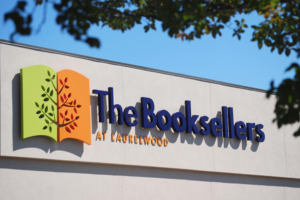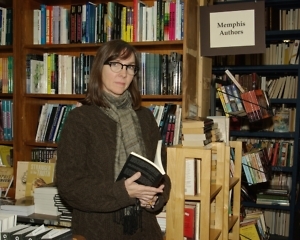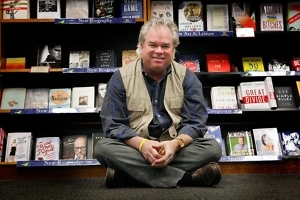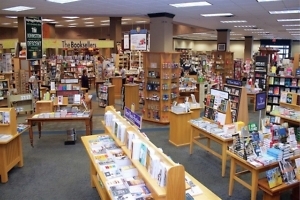When news came that The Booksellers at Laurelwood was shutting its doors for good, Memphis book lovers freely used words like “heartbreaking” and “sad” on social media sites. Former Memphis City Council member Shea Flinn condensed their thoughts into one succinct tweet: “The loss of Booksellers (Davis Kidd, whatever you call it) is just brutal.”
 Neil Van Uum, owner of The Booksellers (which two Nashville entrepreneurs founded in 1985 as Davis-Kidd Booksellers), announced on January 3 that the 25,000-square-foot store would be liquidated—books, furniture, fixtures, everything—starting January 6 and would close when that process ended, likely some time in February.
Neil Van Uum, owner of The Booksellers (which two Nashville entrepreneurs founded in 1985 as Davis-Kidd Booksellers), announced on January 3 that the 25,000-square-foot store would be liquidated—books, furniture, fixtures, everything—starting January 6 and would close when that process ended, likely some time in February.
A potential alternate ending emerged soon after, however. Members of the store’s much admired staff have fielded offers of support, including the financial kind, from customers. “We are in talks with lots of people who are very interested in a version of this store after liquidation,” marketing manager Nicole Yasinsky told Chapter 16 last week. “People who’ve been with us for 32 years know what this means. … After we hug, and cry, they say ‘What can I do?’”
The health of the reading landscape is directly affected by the number of options readers have for finding new titles
A similar threat jolted the Memphis book community six years ago when Van Uum, who lives in Cincinnati, lost the store to a liquidator in a 2011 bankruptcy-related auction. Money from the store’s landlord at Laurelwood Shopping Center subsequently rescued the business and restored it to Van Uum, but Davis-Kidd Booksellers in Nashville, Van Uum’s other Tennessee property, did not survive the bankruptcy.
The Booksellers at Laurelwood has an active members’ list of 5,600 people. The 2017 crisis was initiated by Van Uum’s creditor, and customers were again stunned by news that a store which had seemed to be on solid footing was closing. A high-school student’s change.org petition to “Save Booksellers at Laurelwood from Closing” received nearly 3,000 signatures.

Some readers were surprised when one of the most articulate calls for support came from the other well-known indie bookstore in Memphis. Burke’s Book Store co-owner Cheryl Mesler pointed out that in 2016 The Booksellers at Laurelwood hosted 109 author events and 104 children’s story times, and raised about $35,000 for schools and local organizations. “Memphis, you CANNOT let this wonderful institution go away,” she wrote, noting that the store—presumably Burke’s competitor—“employs some of the best booksellers in the world.”
Mesler was surprised that people were surprised by one bookstore’s support for another. “On a weekly basis, we call them for a customer to see if they’ve got something, or they tell someone to call us,” she told Chapter 16. “It’s going to be tragic if they go away.”
The health of the reading landscape is directly affected by the number of options readers have for finding new titles, Mesler said. “It’s not evident to consumers, but when independent booksellers go away, it will put what gets published in a few hands—just Amazon and a few publishers. If [The Booksellers at Laurelwood] goes away, there are books that wouldn’t get published. We report our sales numbers to The New York Times, and it adds up. We hand-sell things. Each individual bookstore has its own little voice.”
She gave as an example the book After the Jump by The Commercial Appeal’s sports columnist Geoff Calkins. “We sold at least 200 copies of his book, and Booksellers sold about 800. Because of independent sellers, it sold heavily locally.”
The liquidation sale at The Booksellers appears to be nearly complete, but early signs suggest that all isn’t lost. Laurelwood Shopping Center recently posted a reassuring response to one grieving Booksellers customer on Facebook: “We’re working very hard to work something out. This story is not yet over,” said a comment followed by a smiley face. Laurelwood chief operating officer Cory Prewitt acknowledged writing the comment but wouldn’t elaborate. “It was cryptic for a reason,” he said in an interview. Then he added, “A lot of people are working to make this a happy ending.”
And Eddie Burton, the store’s general manager for nearly fifteen years, projected a calm view of the future, just as he had during the store’s 2011 near-death experience, when he told Chapter 16 about one aspect of the business that hasn’t changed: “The customer response here has been both emotional and intense.”
A few days into the liquidation sale, Burton was seated at the well-worn oak table where visiting authors sit while signing books—a table which soon bore a SOLD sticker—as he explained that he, along with marketing manager Nicole Yasinsky and some twenty other staff members, are presenting themselves as an opportunity for Memphis investors: “The city needs this experience. We have a really strong team of booksellers, and we have a really strong management team,” Burton said. “We’ve waited on three generations of Memphians, at least.”
Burton was among the first in line for a job in 1985 when Davis-Kidd Booksellers’ owners Karen Davis and Thelma Kidd opened a Memphis store. He’d worked at Waldenbooks and a couple of small independent bookstores around the city over nearly a decade, but Burton said this grander scale of indie establishment captured the city’s imagination. “We had never seen anything like this here.” He got a plum job: “I started off as a bookseller, shelving the fiction section. And everybody wanted that section so I was lucky to get it.” (The trade-off was that he also had to take the computer-books section.)
“A lot of people are working to make this a happy ending.”
By Memphis book buyers’ standards of the time, Davis-Kidd was a glamorous experience. Peter Taylor signed his Pulitzer Prize-winning A Summons to Memphis at that first store; Burton recalls that the line was extremely long and Taylor’s health was fragile. “So we took books to The Peabody, where he was staying, and he signed all of them that night, and we got everybody’s books to them the next day.” Martha Stewart signed her book about weddings with props that included a woman in a wedding gown and a man in a tuxedo. After Nick Hornby signed his third novel, he asked if anybody in the audience would give him a ride to Graceland.
Over the years, Burton said, he got to see writers who were his favorites, such as David Sedaris and Frank McCourt. And the store’s staff managed crowds who came to see a variety of politicians—Jimmy Carter, Al Gore, Rudy Giuliani, Mike Huckabee—and stars in other fields, such as NFL player Michael Oher.
Davis-Kidd occupied three different spots in its East Memphis neighborhood, moving to the current Laurelwood site, and adding a restaurant, in the mid-1990s. Van Uum—who opened Joseph-Beth Booksellers in Lexington, Kentucky, in 1986—purchased the Davis-Kidd stores in Tennessee in 1997. By the time he filed a Chapter 11 bankruptcy petition in 2010, he had expanded the Joseph-Beth chain to Cincinnati, Pittsburgh, Charlotte, Cleveland, and Fredericksburg, Virginia. But in 2011 he shuttered four of the stores and lost those remaining at auction to his landlord in Lexington or to liquidators. Thanks to his Memphis landlord’s assist, he emerged from the bankruptcy with only The Booksellers at Laurelwood.

Still, in 2017 the liquidation of this store is an industry anomaly. According to the nonprofit American Booksellers Association, these should be heady times, at least by the modest standards to which bookstores have adapted. On its website, the organization has a feature called “Ongoing Indie Resurgence”, currently listing more than thirty good-news stories from 2016 and 2017 in publications ranging from Forbes to The New York Times, The Guardian, The Huffington Post, and numerous city newspapers. “Independent Bookstores Remain on a Roll,” The Associated Press wrote in May. “There is a Reason Why Indie Bookstores Are Thriving,” The Huffington Post wrote this month.
Van Uum is less convinced. “By and large it’s hard to write a good story about how bookstores are healthy,” he said in an interview a day before The Booksellers’ liquidation began. “I jumped back in six years ago … primarily because of the great staff here,” he said, but “it’s a big store with a big rent number, and there just isn’t any growth while other costs are going up.” He blamed erosion of profits on electronic books and a new attitude toward intellectual property: “People think news should be free, music is free—you pay $9.99 a month and get everything ever recorded.” In that context, selling books is a struggle: “You’re looking at $25 or $30 for a hardcover book, and the value isn’t what it used to be, maybe.”
 Nevertheless, in September 2013 Van Uum himself opened a 6,500-square-foot store in downtown Cincinnati called The Booksellers at Fountain Square, and in September 2015, he opened a 12,000-square-foot store in the Dayton, Ohio, area called The Booksellers at Austin Landing. Neither store will be affected by the Memphis liquidation, he said. And even in Memphis, he argues, a smaller store run by The Booksellers’ experienced staff is “a great business opportunity.” In fact, he said, “There are a couple of people here that absolutely could run that store. You’d have to have them as part of the team.”
Nevertheless, in September 2013 Van Uum himself opened a 6,500-square-foot store in downtown Cincinnati called The Booksellers at Fountain Square, and in September 2015, he opened a 12,000-square-foot store in the Dayton, Ohio, area called The Booksellers at Austin Landing. Neither store will be affected by the Memphis liquidation, he said. And even in Memphis, he argues, a smaller store run by The Booksellers’ experienced staff is “a great business opportunity.” In fact, he said, “There are a couple of people here that absolutely could run that store. You’d have to have them as part of the team.”
Nicole Yasinsky, The Booksellers’ marketing manager, calls her colleagues simply “book people,” among whom she’s professionally counted herself for nearly twenty years. She was hired in 1998 as a bookseller and spent thirteen years as manager of the children’s section—her mother was a children’s librarian, so the path seemed natural. She took on the time-intensive job of organizing school events: author visits, book fairs, and fundraisers, including an increasing number of off-site events staffed by the store. Even as The Booksellers at Laurelwood is emptying, children’s author Nick Bruel, who writes the Bad Kitty books and has an appearance scheduled for January 18, plans to keep the date and also visit two schools, at one of which a sponsor will purchase a copy of the book for each child.
Since the store’s closing announcement, Yasinsky said she’s found old lists of employees and hopes to hold a reunion. “Book people are the best people,” she said. “We’re a lot of introverts. We want to be in our book, but the thing that brings us out is books. In recruiting and hiring for a bookstore you want the bookish person and sometimes you worry, ‘Are they gonna come out of their shell?’ They do. That quiet, introverted book person is suddenly the best salesman. Because they believe in what they’re selling.”

Peggy Burch was books editor at The Commercial Appeal in Memphis for ten years, and she also worked as a deputy metro editor and Arts & Entertainment editor for the newspaper. She is a graduate of the Newhouse School of Public Communications at Syracuse University and holds a master’s degree in English literature from the University of Mississippi.





